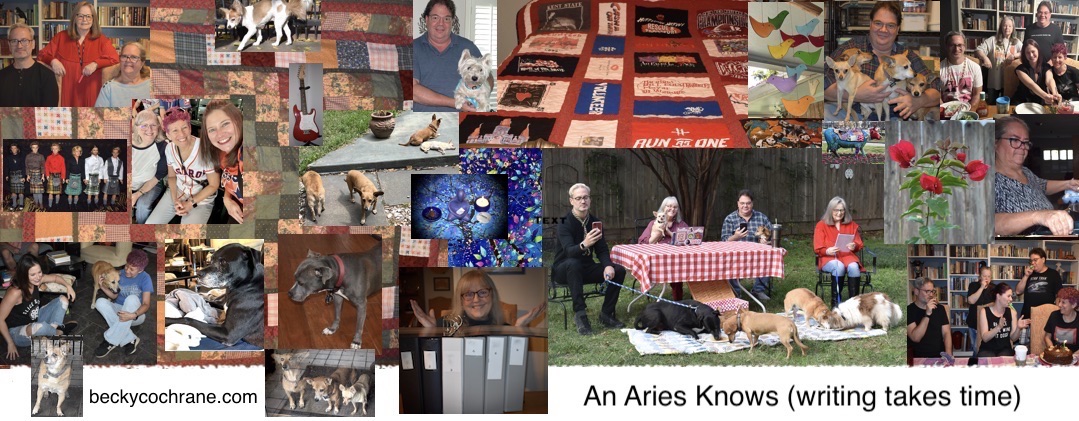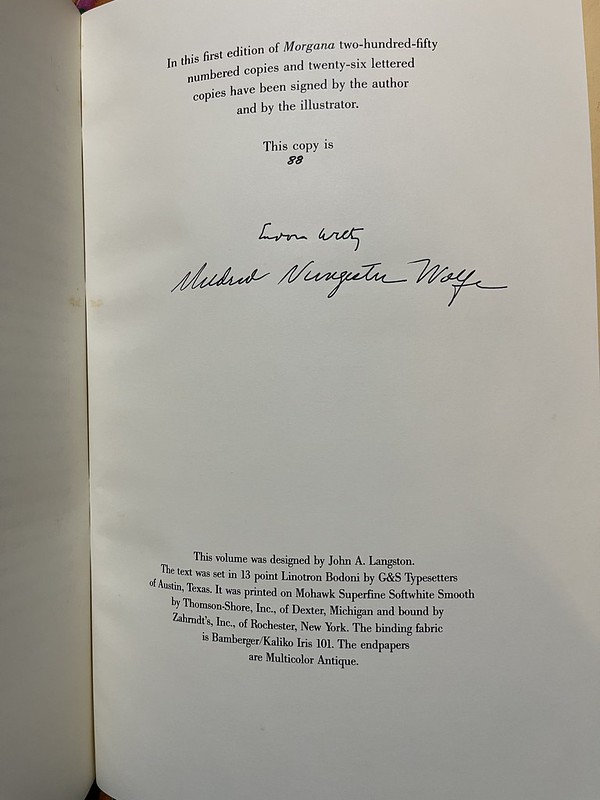These are things that might have been posted on Saturday, May 18 through Monday, May 20.
Here are some of the good things that happened after the storm and tornado on Thursday night. The skies cleared as if nothing had ever happened, and it was still quite a while until sunset. The streets drained. We did what our neighbors did; we went outside to check on each other and know we were all okay. We started clearing tree debris and branches from our yards and the yards of others. We talked and laughed and wondered when we’d get our electricity back.

I realized the beautiful flowers and blossoms from our magnolia tree were strewn up and down the street and into our neighbors’ yards. On one side of Houndstooth, where lives Carl the dog, the wind had blown little branches from our driveway tree and lots and lots of magnolia flowers into their yard. I wasn’t sure if Carl and family were home (I did hear their generator the second night, so they were home at some point), but that first night I moved the mess our trees had made in their yard to the curb. Then Tom and I began picking up the mess in our yard, and he helped neighbors coming from the side streets deal with some of the larger limbs and tree debris in the yards on our street. In this way, we learned we were one of at least three houses with power lines down in our back yards. We figured eventually, we’d be keeping a utility crew very busy.

As we all talked and cleaned up what we could, neighbors often brought tools to help saw off hanging limbs. We know our neighbor on our other side (not Carl’s), though she doesn’t live in the house now, one of her family members does. We got to meet her and apologize for our little dogs trying to fence fight her big dog and her big dog’s friend who sometimes visits. She apologized for the frenzy her dogs cause by barking at ours. We realized that we both felt to blame for dogs just being dogs, as dogs will. Now we can feel better in the future that we all get it and aren’t upset with each other about it.
Neighbors across the street, who had a lot of tree damage, including a big limb on their roof, were out in force cleaning up their yard and helping others. A couple of doors down, they found two fledgling blue jays in a nest in a huge fallen limb. By keeping close watch, they finally spotted the mama, who seemed to be injured but really wanted us all to stay away from her babies. Over the following days, we could see that she was able to fly again and was taking care of her family. A couple of days later, I would spot a bird (to me, it looked like a corvid, but Tom said it wasn’t) that hadn’t made it through the storm. Tom wrapped him up and made his goodbye gentler than his death.
Because of no AC, we kept our windows open at night. The storm left behind one gift: cooler weather. It was pleasant to sleep with those breezes flowing through the house. Once it got dark, there really was no reason not to go to bed early. We split up, Tom in the master bedroom, and me in the office, to give the dogs choices so no bed would have six of us in it at a time. Staying cool and comfortable enough to sleep was the goal. (In a future post, I’ll explain changes we made in the office/craft room in the two or three days before the storm surprised us.)
We had to figure out creative ways to get our devices recharged. We didn’t waste battery power or try to get enough signal to find out what else was going on in the city or the country or the world. As we’ve learned from past weather events, our families and friends who don’t live here know more from their news than we do about what’s going on in Houston. We find out from them when we start getting worried texts, calls, and emails. We’re fine. The dogs are fine. The house is all good. We just want these power lines removed from our back yard so the dogs have freedom to burn off energy.
I would wake up in the mornings before dawn, a dog or two sleeping next to me, appreciating the cool air and listening with happiness to the mourning doves. As the sky lightened, the other birds joined the choir.
In the day, with our windows open, mostly what we heard were tree crews and their chainsaws dealing with all the fallen trees and tree limbs, and the noise of people’s generators. And always, always, we listened for the sounds of utility trucks and the voices of workers who would make life normal by restoring our electricity.
When there was only silence were the hardest times. We marked the twenty-four hours without power with an acknowledgment that everything in the refrigerator was garbage. Maybe tomorrow the crew would arrive and prevent the same fate for the freezer’s contents. Businesses were closed. Some stations had ice but no gasoline. We ended up buying two bags of ice a day, but the time came when we accepted that the freezer contents were garbage, too.
We bagged it and Tom made a trip to RubinSmo Manor, home of The Brides, who heard the storm that night (terrifying to poor Pepper), but didn’t get its full impact and kept power. They offered us whatever we needed: beds, bathrooms, power for phones, washer/dryer, anything. We have a history of opening our homes to one another during these kinds of events, but this time, other than just knowing they were there, we only wanted to put the trash from three kitchens (we weren’t sure if our garbage day would be on time) in the dumpster used by their condo.
I missed my characters and writing. I missed keeping up with family and friends on social media. I colored because that is my calming, good thinking time, always. I think I did two pages on Friday. This one:

From this book.

And this one:

From this book.

On Saturday:

From this book:

Sunday became a hard day. We’d received a message that our power should be restored by end of day. It didn’t happen.
Because Anime always lifts my spirits, I colored this dog who looks a little like her.

From this book.

I started another coloring page on Monday that I’ll share in a different post. My mood was the flattest it had been since the tornado/storm. There was still no power. I used the daylight to read the two Michael Thomas Ford novels (one a re-read; the other its sequel) that I had mentioned in this post. It was a very good sequel, and because of the number of years between Ford’s writing of the books, he was able to make his characters more current and therefore more relevant, even though only a few days had passed in the novels’ timeline. I have never once been disappointed in anything written by him, and having had the chance to get to know him through the years, he’s one of my favorite humans. Can definitely give all the stars to Every Star That Falls.






















 Oh, the things I thought about as I colored this page. I remember how I used to declare, “No regrets. My bad decisions and wrong directions got me to where I am.” Now I can acknowledge that I have some regrets. It’s okay. They show I lived. Would I change things? I might change how I reacted to some things. Mostly, though, I’d change the ways I punish myself, castigate myself, for simply being human.
Oh, the things I thought about as I colored this page. I remember how I used to declare, “No regrets. My bad decisions and wrong directions got me to where I am.” Now I can acknowledge that I have some regrets. It’s okay. They show I lived. Would I change things? I might change how I reacted to some things. Mostly, though, I’d change the ways I punish myself, castigate myself, for simply being human.


 ETA: Look! When I went to return the other two books to my reference shelves, I found this very thin volume (24 pages, which means a mere 12 pieces of paper) tucked among some other books. I took pronunciation seriously! Now, I can hear native French speakers teach me pronunciations online. Students these days have no idea…
ETA: Look! When I went to return the other two books to my reference shelves, I found this very thin volume (24 pages, which means a mere 12 pieces of paper) tucked among some other books. I took pronunciation seriously! Now, I can hear native French speakers teach me pronunciations online. Students these days have no idea…

 After graduating from college and before I went back to graduate school a few years later, I read voraciously, trying to fill in gaps in my studies. I believe that might have been the reason I bought this beat-up paperback from a used bookstore for fifty cents. Had I read short stories by Welty in survey classes like the Southern lit class? Or did I just know she was highly recommended? I don’t remember. I did read it, and it didn’t really resonate with my reading interests of that time. In hindsight, I realize I undervalued it.
After graduating from college and before I went back to graduate school a few years later, I read voraciously, trying to fill in gaps in my studies. I believe that might have been the reason I bought this beat-up paperback from a used bookstore for fifty cents. Had I read short stories by Welty in survey classes like the Southern lit class? Or did I just know she was highly recommended? I don’t remember. I did read it, and it didn’t really resonate with my reading interests of that time. In hindsight, I realize I undervalued it.



 In copies of papers given to me by one of my mother’s nephews relating to his father (a writer, and one of the first who told me I could be a writer), there were a couple of copies of letters my uncle wrote to my mother. In a way that I understand all too well, he specifically mentioned Welty’s novel Losing Battles as a work that made him despair of ever being as good a writer. This so piqued my interest that I downloaded the book (this was last December), and I finally got around to reading it in April. Very long, lots of characters, and lots of stories within the narrative framework of a novel. It wasn’t an easy or fast read, but it kept me engaged.
In copies of papers given to me by one of my mother’s nephews relating to his father (a writer, and one of the first who told me I could be a writer), there were a couple of copies of letters my uncle wrote to my mother. In a way that I understand all too well, he specifically mentioned Welty’s novel Losing Battles as a work that made him despair of ever being as good a writer. This so piqued my interest that I downloaded the book (this was last December), and I finally got around to reading it in April. Very long, lots of characters, and lots of stories within the narrative framework of a novel. It wasn’t an easy or fast read, but it kept me engaged.
